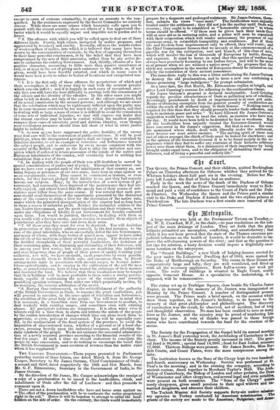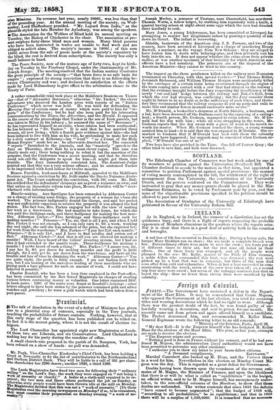3littrupalio.
A large meeting was held at the Freemasons' Tavern on Tuesday,— Mr. W. R. Crawford, M.P., in the chair,—to pass resolutions on the sub- ject of the main drainage of London. They set forth that the plans hitherto submitted are incomplete, conflicting, and unsatisfactory ; that while it has not been proved that the state of the Thames exercises pre- judicial influence on the health of London, it would be desirable to im- prove the self-cleansing powers of the river' and that as the question is not ripe for solution, a hasty decision would impose a frightfully enor- mous taxation on the ratepayers.
The "Strand Buildings," a new block of lodging-houses erected for the poor under the Labourers' Dwelling Act of 1855, were opened by the Duke of Marlborough on Saturday. The rooms in these houses are comparatively large and lofty, they are well ventilated, and fitted up with all the necessary appliances. Rent half-a-crown per week per room. The suite of buildings is situated in Eagle Court, nearly opposite Somerset House. As a speculation the undertaking, it is supposed, will be remunerative.
The statue set up in Trafalgar Square, close beside Sir Charles James Napier, in honour of the memory of Dr. Jenner' was inaugurated on Monday by the Prince Consort A number of distinguished persons were present. The Prince made a brief speech, on the occasion which drew them together, on Dr. Jenner's birthday, to do honour to the memory of that great philosopher and philanthropist. The discovery of vaccination was the result, he observed, not of accident, but of long and thoughtful observation. No man has been enabled to save so many lives as Dr. Jenner, and the country may be proud of numbering him among her sons. A vote of thanks was passed to those foreTn states who have contributed towards the fund for the erection of the statue.
The Society for the Propagation of the Gospel held its annual meeting in St. James's Hall yesterday week, the Archbishop of Canterbury in the chair. The income of the Society greatly increased in 1867. The gene- ral fund is 80,0001.; special fund 13,2001.; fund for East Indian missmes 17,0001. Thirteen Bishops were present. Sir James Brooke, Miss Bur- dett Coutts, and Count Platen, were the more conspicuous among the laity. The institution known as the Sons of the Clergy kept its two hundred- and-fourth anniversary on Wednesday. Service was performed at St. Paul's in the morning ; and in the evening the company, according 10 ancient custom, dined together in Merchant Taylor's Hall. The Arch- bishop of Canterbury, the Bishop of London and other prelates, the Dean of Westminster and other clergymen and several legal and civic notables, were present on both occasions. The "Sons of the Clergy" assigti needy clergymen, gives small pensions to their aged widows and un- married daughters, and educates their children. The Turkish Mission' Aid Society supports forty-six native mission- ary agencies in Turkey conducted by American missionaries. The grants of the society are made to the American, Bulgarian, and Arose- Man Missions. Its revenue last year, nearly 30001., was less than that of the preceding year. At the annual meeting of the society, on Wed- nesday, Lord Shaftesbury presided. "Mr. Layard from India," as the placards styled the late Member for Aylesbury, was among the speakers. .The Association for the Welfare of Blind held its annual meeting on Tuesday, the Bishop of Chichester in the chair. The association at pre- sent employs forty-three blind men and women. Many blind persons who have been instructed in trades are unable to find work and are obliged to solicit alms. The society's income is 18001.; of this sum 10501. arises from the sale of goods made at the society's repository by the blind, the rest is derived from subscriptions. The society has only a small balance in hand.
The Peace Society, now of the mature age of forty-two, kept its birth- day on Tuesday in the Finsbury Chapel, under the chairmanship of Mr. Joseph Sturge. The meeting resolved that the Indian mutiny illustrates the great principle of the society—" that brute force is no safe basis for empire"; expressed its strong conviction that there is no fellowship be- tween Christianity and war; and declared its satisfaction at the efforts made by Lord Malmesbury to give effect to the arbitration clause in the Treaty of Paris.
A rather remarkable trial took place at the Middlesex Sessions on Thurs- day—that of "Alexander Borromeo," otherwise "Dr. Tucker," the clever adventurer who deceived the London press with reports of an "Italian Conference" which never was held. He was tried for defrauding the Morning Star of certain sums of money which were paid to him for re- ports' of the Conference; but he had also been paid for his interesting communications by the Tunes, the Advertiser, and the Herald. It appeared in the course of the ,proceedings that Tucker is the son of Irish parents, but was taken to Milan in his infancy he assumed the name of" Borromeo " ; he has represented himself as an exile whose estates had been confiscated; he has lectured as " Dr. Tucker." It is said that he has married three women, all now living ; while a fourth gave evidence against him—she had been induced to live with him as his wife, he pretending to make her such by a civil contract at Kilkenny—his "word " "as a Count of the Holy Roman Empire" made her so : he afterwards deserted her. The concocted " reports " furnished to the journals, and his " masterly " speech to the Jury on Thursday, show that he is a most clever rogue. The case was clearly made out; there being nothing to rebut it but the assertion of the prisoner, that the Conference was a secret meeting, and that he therefore could not call the delegates to speak for him—it might get them into trouble. The Jury immediately: convicted him. Ihe Assistant-Judge pointed out that this was a very serious offence; and he sentenced Tucker to be imprisoned with hard labour for twelve months.
Messrs. Pontifex, lead-merchants at MiUwall, appealed to the Middlesex Sessions against a conviction by Mr. Selfe under the Smoke Nuisance Abate- ment Act. The Court confirmed the conviction, with 10/. costs. Mr. Bod- kin notified that the defendants' chimneys are as great a nuisance as ever, and that unless an immediate reform take place, Messrs. Pontifex will be " over- whelmed with informations."
Mantle-making. Ann Spettigue has been remanded by Alderman Carter on a charge of stealing some fringe, the property of a woman for whom she worked. The prisoner indignantly denied the charge, and said her pocket was not sufficiently capacious to receive the property it was alleged she had stolen. The fact was, Mrs. Parkes engaged her with the view of making her work as a forewoman. She had mantles to take home, for which she was paid five farthings each, and three-halfpence for making the best man- tles. Alderman Carter—" Five farthings and three-halfpence each for making mantles ? " Prisoner—" Yes, sir, that is all I get, and when I told Mrs. Parkes it was not enough, as I can only earn 46.9d. a week, working day and night, she said she was ashamed of the price but she expected bet- ter work from the warehouse." Mrs. Parkes—" I pityler 2id. each mantle." Prisoner—" It is only lid., and I have to find needles and cotton out of that." Alderman Carter—"And that is all you are allowed for making a mantle ! Well, I have heard of the tailors' sweating system, but I had no idea it had extended to the mantle trade. Three-halfpence for making a mantle! I never heard of such a thing." Mrs. Parkes—" I assure you, sir, I pay her 2s. 6d. per dozen for making mantles and the profit is little enough, for I only get 3s. per dozen from the warehouse, and have all the trouble and loss of time in obtaining the work." Alderman Carter—" You are quite right, the profit is little enough. I am not finding fault with
but I sin looking at the merciless dealing of those merchants who are giving such a bare pittance for such an amount of work. I could not have believed it possible."
Charles Randall, who has been a long time employed in the Post-office, has been committed by the Bow Street Magistrate on charges of stealing various letters containing money or valuables. One letter contained 2051. in bank-notes : 1501. of the notes were found at Randall's lodgings ; other letters alleged to have been stolen by the prisoner contained gold and silver watches and jewellery ; he wore a gold watch which had been taken from a post-parcel.



























 Previous page
Previous page